
| N001 | 1 | N | S |
| On an Airspace map an FAD means | |||
| 1 | A Danger area, you can fly there, but certain activity, like aerobatics can happen | ||
| -1 | A Prohibited Area, you can not enter into that airspace at all | ||
| -1 | A Restricted Area, better stay out of it | ||
| -1 | A Defense Force Area, you will be used for shooting practice if you fly there | ||
| http://www.savas.co.za/cairspace.php | |||
| N002 | 1 | N | S |
| On an Airspace map an FAP means | |||
| -1 | A Danger area, you can fly there, but certain activity, like aerobatics can happen | ||
| 1 | A Prohibited Area, you can not enter into that airspace at all | ||
| -1 | A Restricted Area, better stay out of it | ||
| -1 | A Defense Force Area, you will be used for shooting practice if you fly there | ||
| http://www.savas.co.za/cairspace.php | |||
| N003 | 1 | N | S |
| On an Airspace map an FAR means | |||
| -1 | A Danger area, you can fly there, but certain activity, like aerobatics can happen | ||
| -1 | A Prohibited Area, you can not enter into that airspace at all | ||
| 1 | A Restricted Area, better stay out of it | ||
| -1 | A Defense Force Area, you will be used for shooting practice if you fly there | ||
| http://www.savas.co.za/cairspace.php | |||
| N004 | 1 | N | B |
| The Sun sets in the | |||
| 1 | West | ||
| -1 | East | ||
| -1 | South | ||
| -1 | North | ||
| N005 | 1 | N | B |
| At noon the sun is located in South Africa in the | |||
| 1 | North | ||
| -2 | South | ||
| -1 | East | ||
| -1 | West | ||
| N006 | 1 | N | B |
| The expression Authority to Fly or Permission to Fly | |||
| 1 | is based on a law that no person or man made object is allowed to fly in South Africa unless one gets permission from the government | ||
| 1 | Has been delegated by the SA government to the CAA for administration | ||
| 1 | CAA has appointed the Aero Club of SA to administrate this for Hang Gliding and Paragliding | ||
| -1 | CAA has appointed SAHPA to administrate this for Hang Gliding and Paragliding | ||
| N007 | 1 | N | B |
| About 20 gliders are ridge soaring when the wind dies and everyone has to go for landing | |||
| 1 | The gliders who are lower than me have right of way | ||
| 1 | The gliders to my right have right of way | ||
| -1 | The gliders to my left have right of way | ||
| -1 | The faster gliders have right of way | ||
| N008 | 1 | N | B |
| VFR | |||
| 1 | means Visual Flight Rules and applies to Hang Gliders and Paragliders | ||
| -1 | Does not apply for Hang Gliding and Paragliding | ||
| 1 | means 8 km visibility, not flying into cloud, not flying at night | ||
| -1 | stands for Vee Follow Railway - a way of navigation before GPS was around | ||
| N009 | 1 | N | S |
| A TMA is labeled FL110 / 4500 ALT .. | |||
| 1 | Controlled airspace from 1500m ASL to 3300m ASL | ||
| -1 | Controlled airspace starting from 4500m ASL to 110 km | ||
| -1 | Temporary Closed area from day 110 of the year above 4500m altitude | ||
| -1 | Low flying Temporary Military Aviation activity, starts every day at 11.00, up to 4500 ft | ||
| N010 | 1 | N | S |
| With a GPS 12 track memory of 1024 points, and an expected task time to fly for 4 hours, to what value are you going to set the track sample rate? | |||
| 1 | 15 seconds | ||
| -1 | 30 seconds | ||
| -1 | 5 seconds | ||
| -1 | 60 seconds | ||
| N011 | 1 | N | S |
| While flying cross country, what do you look out for | |||
| 1 | Possible landing places | ||
| 1 | Wind drift | ||
| 1 | Smoke, flags, | ||
| -1 | the way cows are grazing on the ground | ||
| -1 | speed of your glider in comparison to speed of the cars on the ground | ||
| -1 | shadow of you glider on the ground | ||
| 1 | cloud shapes, if any, and how they develop | ||
| 1 | cloud shadow movement on the ground | ||
| -1 | battery charge status on your radio and cell phone | ||
| N012 | 1 | N | S |
| If you head 1.852 km straight East from your current position of S28 degree 30 minutes East | |||
| -1 | you will be at 28 degree 31 minutes East | ||
| -1 | you will be at 28 degree 31.852 minutes East | ||
| -1 | you will be at 28 degree 29 minutes East | ||
| -1 | you will be at 28 degree 28.148 minutes East | ||
| 1 | Can not be that easily determined without a map at hand | ||
| N013 | 1 | N | S |
| If you head 1.852 km straight North from S26 degree 30 minutes | |||
| -1 | you will be at 26 degree 31 minutes South | ||
| -1 | you will be at 26 degree 31.852 minutes South | ||
| 1 | you will be at 26 degree 29 minutes South | ||
| -1 | you will be at 26 degree 28.148 minutes South | ||
| -1 | Can not be that easily determined without a map at hand | ||
| N014 | 1 | N | S |
| 1 nautical mile corresponds to | |||
| 1 | 1.852 km | ||
| 1 | 1 minute at the equator | ||
| -1 | 111 km | ||
| -1 | 60 km | ||
| N015 | 1 | N | S |
| 1 degree at the equator corresponds to | |||
| 1 | 60 nautical miles | ||
| 1 | 111 km | ||
| -1 | 273 degree Kelvin | ||
| 1 | 60 minutes | ||
| N016 | 1 | N | B |
| In South Africa in Winter the Sun at noon is located | |||
| 1 | In the North | ||
| -1 | In the South | ||
| -1 | In the West | ||
| -1 | In the East | ||
| N017 | 1 | N | S |
| A Magnetic compass used SW of Kuruman at Sishen a big iron ore mine | |||
| 1 | Will deviate quite severe from true North | ||
| -1 | Will show true North | ||
| -1 | will not work at all | ||
| -1 | will work ok, once left for half an hour undisturbed before takeoff to adjust | ||
| N018 | 1 | N | S |
| A pilot has set his GPS to GOTO TAKEOFF and reports his position on a Bearing BRG of 90 | |||
| 1 | He is to the West of takeoff | ||
| -1 | He is to the East of takeoff | ||
| -1 | He is flying in an easterly direction, could be anywhere | ||
| -1 | He is flying in a Westerly direction and can be anywhere | ||
| N019 | 1 | N | S |
| A pilot has set his GPS on GOTO TAKEOFF and reports the heading of his Track TRK as 90 | |||
| -1 | He is to the West of takeoff | ||
| -1 | He is to the East of takeoff | ||
| 1 | He is flying in an easterly direction, could be anywhere | ||
| -1 | He is flying in a Westerly direction and can be anywhere | ||
| N020 | 1 | N | S |
| Setting your Vario to QFE means ... | |||
| 1 | A2 has been set to zero and you will then get the AGL altitude displayed | ||
| -1 | You will get the altitude above sea level displayed | ||
| -1 | It will show the altitude in relation to 1013.25mb reference standard atmosphere | ||
| -1 | You switch off the sink alarm, Quiet Flying Environment | ||
| N021 | 1 | N | S |
| What is the name of the unit used in aviation which has a value of 1.852 km/h | |||
| 1 | one knot | ||
| -1 | one nautical mile | ||
| -1 | one foot | ||
| -1 | one degree | ||
| N022 | 1 | N | S |
| A blue hole is | |||
| 1 | A cloudless area on a thermic day where one expects very few thermals | ||
| -1 | A tear in a paraglider that goes through the top and bottom surface | ||
| -1 | A task in a competition where no one made goal | ||
| -1 | An aerobatics maneuver | ||
| N023 | 1 | N | B |
| One should always try to land | |||
| 1 | into Wind | ||
| -2 | With the wind | ||
| -1 | cross Wind | ||
| -1 | in no wind | ||
| N024 | 1 | N | B |
| A Hang Glider is climbing towards you in a thermal, turning the opposite direction | |||
| 1 | You are above him and he can not see you. Change turn direction and get out of the way | ||
| -1 | Since you established the thermal first you determined the thermal direction. He will change turn direction when he gets closer | ||
| -1 | Hang Gliders have to give way to Paragliders. He will look out for you | ||
| -1 | The stronger lift will soon catch up with you and you will also climb better | ||
| N025 | 1 | N | S |
| A GPS set to GOTO BULWER shows a TRK of 358 and a BRG of 178 | |||
| 1 | You are North of Bulwer heading North | ||
| -1 | You are South of Bulwer, heading North | ||
| -1 | You are North of Bulwer, heading South | ||
| -1 | You are South of Bulwer, heading South | ||
| N026 | 1 | N | B |
| If you can hear thunder while flying ... | |||
| 1 | means it is 16km or less away | ||
| 1 | means you are in trouble, get down and land, fast | ||
| -1 | means to head towards it to find good lift | ||
| -1 | can be ignored | ||
| N027 | 1 | N | B |
| To get out of cloudsuck | |||
| 1 | Fly sideways in relation to the main wind direction | ||
| -1 | Fly downwind, with the wind | ||
| -1 | Fly upwind, into wind | ||
| -1 | Stay where you are and turn, it will stop | ||
| N028 | 1 | N | B |
| You are 1500 meter AGL. Your average sink is 1m/s. Your GPS reckons that your Ground speed is 36 km/h. Assuming no change, how far will you get? | |||
| 1 | 15 km | ||
| -1 | 30 km | ||
| -1 | 20 km | ||
| -1 | 36 km | ||
| N029 | 1 | N | S |
| Which statements are true in using a GPS | |||
| 1 | One can collect Waypoints by MARK/ENTER | ||
| 1 | One can download Waypoints to a PC via a datacable | ||
| 1 | A GPS can collect track points | ||
| 1 | One can download track points to a PC via a datacable | ||
| -3 | The only way to collect coordinates of a Waypoint is to write them down on paper | ||
| 1 | Your track memory fill rate depends on the sample rate setting | ||
| -3 | Your track memory fill rate depends on the amount of turnpoints of the task | ||
| N030 | 1 | N | S |
| 25 km/h corresponds to | |||
| 1 | 13 knots | ||
| -1 | 45 knots | ||
| -1 | 3 m/s | ||
| -1 | 6 nautical miles | ||
| N031 | 1 | N | B |
| Dusk Dnd dawn are longer | |||
| 1 | as one goes further South in South Africa | ||
| -1 | as one goes further North in South Africa | ||
| -1 | in winter | ||
| -1 | in summer | ||
| N032 | 1 | N | B |
| Which statement is true | |||
| 1 | Sunset is later in Summer | ||
| 1 | Sunrise is earlier in Summer | ||
| -1 | Sunset is earlier in Summer | ||
| -1 | Sunrise is later in Summer | ||
| N033 | 1 | N | S |
| You plan to winch off the XYZ airfield. The main tar runway says 07 at one end. The wind is Northerly. The field got a grass runway on an angle of 100 degree to the main runway. What will you announce on the airband radio when you launch a paraglider, using the most suitable runway into wind? | |||
| 1 | XYZ Traffic, Paraglider winchlaunched on 33 grass runway | ||
| -1 | XYZ Traffic, Paraglider winchlaunched on 17 grass runway | ||
| -1 | XYZ Traffic, Paraglider winchlaunched on 25 grass runway | ||
| -1 | XYZ Traffic, Paraglider winchlaunched on 32 grass runway | ||
| -1 | XYZ Traffic, Paraglider winchlaunched on 15 grass runway | ||
| -1 | XYZ Traffic, Paraglider winchlaunched on 33 tar runway | ||
| -1 | XYZ Traffic, Paraglider winchlaunched on 07 tar runway | ||
| -1 | XYZ Traffic, Paraglider winchlaunched on 25 tar runway | ||
| -1 | XYZ Traffic, Paraglider winchlaunched on 33 tar runway | ||
| N034 | 1 | N | S |
| You plan to winch off the XYZ airfield. The main tar runway says 07 at one end. The wind is Westerly. The field got a grass runway on an angle of 100 degree to the main runway. What will you announce on the airband radio when you launch a paraglider, using the most suitable runway into wind? | |||
| -1 | XYZ Traffic, Paraglider winchlaunched on 33 grass runway | ||
| -1 | XYZ Traffic, Paraglider winchlaunched on 17 grass runway | ||
| -1 | XYZ Traffic, Paraglider winchlaunched on 25 grass runway | ||
| -1 | XYZ Traffic, Paraglider winchlaunched on 32 grass runway | ||
| -1 | XYZ Traffic, Paraglider winchlaunched on 15 grass runway | ||
| -1 | XYZ Traffic, Paraglider winchlaunched on 33 tar runway | ||
| -1 | XYZ Traffic, Paraglider winchlaunched on 07 tar runway | ||
| 1 | XYZ Traffic, Paraglider winchlaunched on 25 tar runway | ||
| -1 | XYZ Traffic, Paraglider winchlaunched on 33 tar runway | ||
| N035 | 1 | N | S |
| Flying trimspeed into wind your GPS shows 16 km/h and when you turn downwind you got 60 km/h | |||
| 1 | Your trim speed is 38 km/h | ||
| -1 | Your trmi speed is 36 km/h | ||
| -1 | Your trim speed is 34 km/h | ||
| -1 | One can not determine the trim speed with this info | ||
| http://www.sahpa.co.za/sahpa/programs/skygod/Navigation/gpsinfo.htm 16+60 / 2 | |||
| N036 | 1 | N | S |
| Flying trimspeed into wind your GPS shows 16 km/h and when you turn downwind you got 60 km/h | |||
| 1 | The wind speed is 22 km/h | ||
| -1 | The wind speed is 26 km/h | ||
| -1 | The wind speed is 24 km/h | ||
| -1 | One can not determine the wind speed with this info | ||
| http://www.sahpa.co.za/sahpa/programs/skygod/Navigation/gpsinfo.htm 60-16 / 2 | |||
| N037 | 1 | N | B |
| Since we are allowed to fly only in VFR conditions which means ... | |||
| 1 | up to FL100 minimum visibility 5 km | ||
| 1 | from FL100 to FL200 minimum visibility 8 km | ||
| 1 | stay clear of cloud, up to FL100 Horizontally: 2000 feet, Vertically: 500 feet | ||
| 1 | stay clear of cloud, from FL100 to FL200 Horizontally: 1.5 km, Vertically: 1000 feet | ||
| 1 | fly during daylight only | ||
| -5 | VFR does not apply for Hang Gliding or Paragliding | ||
| CAA Part 91.06.21 | |||
| N038 | 1 | N | S |
| FL195 means ... | |||
| 1 | Flight Level 195, 19500 feet ASL, or around 6200 meters | ||
| -1 | Flight Level 195, 19500 feet AGL, or around 6200 meters above ground | ||
| 1 | The maximum one can go up in SA in a Paraglider outside of any other airspace restrictions | ||
| -1 | Flight Level 195, 19500 meters ASL | ||
| -1 | Foot Launch takeoff, 195 meters high | ||
| -1 | Forward Launch only take off, 195 meters wide | ||
| http://www.ecacnav.com/files/TMA%20Design%20-%20English%20%20Version.pdf | |||
| N039 | 1 | N | S |
| What does the expression ASL or AMSL mean ... | |||
| 1 | ASL = Above Sea Level | ||
| -1 | ASL = Above Surface Level | ||
| 1 | AMSL = Above Mean Sea Level | ||
| -1 | AMSL = Above Mean Surface Level | ||
| http://www.ecacnav.com/files/TMA%20Design%20-%20English%20%20Version.pdf | |||
| N040 | 1 | N | S |
| What does the expression AGL mean ... | |||
| 1 | AGL = Above Ground Level | ||
| -1 | AGL = Aerodrome Ground Level | ||
| -1 | AGL = Above Glider Launch | ||
| -1 | AGL = Aircraft Ground Landing | ||
| http://www.ecacnav.com/files/TMA%20Design%20-%20English%20%20Version.pdf | |||
| N041 | 1 | N | S |
| What does the expression ft mean ... | |||
| 1 | ft = feet, 3 feet is approximately 1 meter | ||
| -1 | ft = feet, 3 meters is approximately 1 feet | ||
| -1 | ft = final track, your heading before you flare | ||
| -1 | ft = foot takeoff | ||
| http://www.ecacnav.com/files/TMA%20Design%20-%20English%20%20Version.pdf 1m=3.2808 ft | |||
| N042 | 1 | N | S |
| What does the expression GND mean ... | |||
| 1 | GND = Ground | ||
| -1 | GND = Glide Normal Distance | ||
| -1 | GND = General Navigation Device | ||
| -1 | GND = Global Navigation Device | ||
| http://www.ecacnav.com/files/TMA%20Design%20-%20English%20%20Version.pdf | |||
| N043 | 1 | N | S |
| What does the expression NM mean ... | |||
| 1 | NM = Nautical Mile , 1.8 km | ||
| -1 | NM = Navigation Manager | ||
| -1 | NM = Nautical Manager | ||
| -1 | NM = Normal Mile, 1.6 km | ||
| http://www.ecacnav.com/files/TMA%20Design%20-%20English%20%20Version.pdf | |||
| N044 | 1 | N | S |
| What does the expression VFR mean ... | |||
| 1 | VFR = Visual Flight Rules | ||
| -1 | VFR = Vee Follow Railway | ||
| -1 | VFR = Very Fast Reserve | ||
| -1 | VFR = Virtual Flying Rules | ||
| http://www.ecacnav.com/files/TMA%20Design%20-%20English%20%20Version.pdf | |||
| N045 | 1 | N | S |
| What does the expression Ceiling mean on an ICAO map ... | |||
| 1 | Ceiling = Maximum height before we go into Controlled Airspace | ||
| -1 | Ceiling = Another word for cloudbase | ||
| -1 | Ceiling = The top of the inversion layer | ||
| -1 | Ceiling = Maximum height to go over a goal line | ||
| N046 | 1 | N | S |
| The task uses 400m cylinders. How big do you set you GPS 12 zoom display to see the inner circle as the tunrpoint cylinder? | |||
| 1 | 2 km | ||
| -1 | 1.2 km | ||
| -1 | 0.4 km | ||
| -1 | 4 km | ||
| N047 | 1 | N | B |
| If a ridge is 200 meters high, how far behind can you land safely and why ? | |||
| 1 | 2 km | ||
| -1 | 200 meters | ||
| -1 | 1 km | ||
| -1 | 4 km | ||
| 1 | due to Rotor and turbulence in the lee | ||
| -1 | due to katabatic airflow which runs down the slope | ||
| -1 | due to whirlys which kick off in the windshadow | ||
| -1 | due to wind shadow behind the ridge resulting in no airspeed for the glider | ||
| N048 | 1 | N | S |
| The wind is around 18 km/h. The smoke is going up under a 45 degree angle. And your Glider will have a 2 m/s polar sink rate to turn in that thermal. What lift will your vario show when you get into the smoke? | |||
| 1 | 3 m/s | ||
| -1 | 5 m/s | ||
| -1 | 2 m/s | ||
| -1 | 1 m/s | ||
| -1 | 4 m/s | ||
| 18 km/h = 5m/s. 5 - 2 = 3 | |||
| N049 | 1 | N | S |
| To calculate the distance for a world record one uses | |||
| 1 | a Great Circle Distance formula from FAI | ||
| -1 | the Bernoulli equation | ||
| -1 | Daltons law | ||
| -1 | the GAP Formula | ||
| -1 | a Great Circle Distance formula from SAHPA | ||
| N050 | 1 | N | S |
| What is the lower limit of a CTR | |||
| 1 | ground level | ||
| -1 | 1000 ft | ||
| -1 | 300 meter AGL | ||
| -1 | it joins the TMA around it | ||
| -1 | it joins the CTA around it | ||
| N051 | 1 | N | S |
| Which airspace starts on the ground | |||
| 1 | CTR | ||
| -1 | TMA | ||
| -1 | ATZ | ||
| -1 | CTA | ||
| N052 | 1 | N | S |
| When can you fly into a CTR | |||
| -1 | when it is not active | ||
| 1 | when I get permission by the tower | ||
| -1 | only on weekends and public holidays | ||
| -1 | always | ||
| N053 | 1 | N | B |
| South Africa is located | |||
| 1 | in the Southern Hemisphere | ||
| -1 | in the Northern Hemisphere | ||
| -1 | in the Eastern Block | ||
| -1 | in the NATO | ||
| N054 | 1 | N | S |
| The sun in Southern Africa will everywhere be | |||
| -1 | in the North | ||
| -1 | in the South | ||
| 1 | mostly in the North, but in summer noon North of Limpopo it can be in the South | ||
| -1 | mostly in the South, but in summer noon South of Limpopo it can be in the North | ||
| N055 | 1 | N | S |
| Lunch time in the center of South Africa and you shadow on the ground is in front of you | |||
| 1 | you are facing South | ||
| -1 | you are facing North | ||
| -1 | it depends on the wind direction | ||
| -1 | you are facing west | ||
| N056 | 1 | N | S |
| the end points of the earth axis are called | |||
| 1 | geographic North and South pole | ||
| -1 | Nadir and Zenith | ||
| -1 | magnetic North and South pole | ||
| -1 | Ursa minor and Ursa major | ||
| N057 | 1 | N | B |
| South Africa is located | |||
| 1 | about 30 degree East of the Greenwich meridian | ||
| -1 | about 30 degree West of the Greenwich meridian | ||
| -1 | about 30 degree South of the Greenwich meridian | ||
| -1 | about 30 degree North of the Greenwich meridian | ||
| N058 | 1 | N | S |
| A pilot has send his landing coordinates via SMS to you. You pinpoint his position on a 1:500.000 ICAO map. It is about 5cm away from your position. | |||
| 1 | He is about 25 km away from you | ||
| -1 | He is about 2.5 km away from you | ||
| -1 | He is about 50 km away from you | ||
| -1 | He is about 10 km away from you | ||
| N059 | 1 | N | S |
| A US pilot reports that he was going up with a 100 ft per minute | |||
| 1 | nothing to brag about, 0.5 m/s | ||
| -1 | not bad, good 5 m/s thermal | ||
| -1 | he was in a thunderstorm cloud, 20 m/s | ||
| -1 | printing mistake, lift is only expressed in m/s | ||
| 1000 ft/min = 5m/s | |||
| N060 | 1 | N | S |
| A pilot has reported his position as 9km from takeoff on a bearing of 330. You are 10 km from takeoff on a bearing of 330 | |||
| 1 | The pilot is Nw of you | ||
| -1 | The pilot is SW of you | ||
| -1 | The pilot is SE of you | ||
| -1 | The pilot is NE of you | ||
| N061 | 1 | N | S |
| Ceiling is 7600 ft. | |||
| 1 | This corresponds to 2300m ASL. 7600/3 | ||
| -1 | This corresponds to 2300m AGL. 7600 /3 | ||
| -1 | This correponds to 1400m AGL. ((7600/10)*2)- 10 percent | ||
| -1 | This corresponds to 1400m ASL. ((7600/10)*2)-10 percent | ||
| 1m = 3.2808 ft | |||
| N062 | 1 | N | S |
| Flying under the JHB Special Rules area at The Dam or Dunnottar | |||
| 1 | One has to use the QNH of JHB International | ||
| -1 | One has to 0 your altimeter on takeoff | ||
| -1 | One has to fly QFE | ||
| -1 | One has to use 1013 hPa setting | ||
| http://www.aeropages.co.za/SRA.htm | |||
| N063 | 1 | N | S |
| What does this picture mean ... | |||
 |
|||
| 1 | Danger Area | ||
| -1 | Do not fly into it | ||
| -1 | It starts from FL 70 | ||
| -1 | It is a Notam | ||
| JHB Special rules area map | |||
| N064 | 1 | N | S |
| What does this picture mean ... | |||
 |
|||
| 1 | This applies from Ground to 2300 meters ASL | ||
| -1 | Do not fly into it | ||
| -1 | It is a Federal Air Defense area | ||
| -1 | It is a Notam | ||
| JHB Special rules area map | |||
| N065 | 1 | N | S |
| What does this picture mean ... | |||
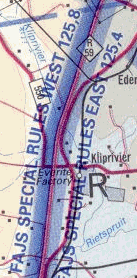 |
|||
| 1 | Use 125.4 MHz airband radio frequency when East of this line | ||
| -1 | Do not fly into it unless you contact the tower on 125.4MHz | ||
| -1 | East starts from FL 125, down to FL4 | ||
| -1 | West starts from FL 125 down to FL 8 | ||
| JHB Special rules area map | |||
| N066 | 1 | N | S |
| What does this picture mean ... | |||
 |
|||
| 1 | Prohibited Area | ||
| -1 | You can fly into it | ||
| -1 | It starts from FL 80 | ||
| -1 | It is a Notam | ||
| JHB Special rules area map | |||
| N067 | 1 | N | S |
| What does this picture mean ... | |||
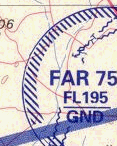 |
|||
| 1 | Restricted Area | ||
| -1 | You can fly into it | ||
| -1 | It starts from FL 75 | ||
| -1 | It is a Notam | ||
| JHB Special rules area map | |||
| N068 | 1 | N | S |
| What does this picture mean ... | |||
 |
|||
| 1 | This shows a VOR | ||
| -1 | This is a CTR for winch launch activity | ||
| -1 | Contact the tower at 116.0 MHz | ||
| -1 | It is a NDB | ||
| JHB Special rules area map | |||
| N069 | 1 | N | S |
| What does this picture mean ... | |||
 |
|||
| 1 | This is a NDB | ||
| -1 | This is a VOR | ||
| -1 | It is a Parachute Drop Zone | ||
| -1 | It is a Danger Area | ||
| JHB Special rules area map | |||
| N070 | 1 | N | S |
| Which of those map snippets show an airspace that you are not allowed to fly in | |||
| 1 | FAP | ||
 |
|||
| -1 | PNV | ||
 |
|||
| -1 | FAD | ||
 |
|||
| -1 | WB | ||
 |
|||
| JHB ICAO map | |||
| N071 | 1 | N | S |
| How high is this takeoff? | |||
 |
|||
| 1 | 1600 meter | ||
| -1 | 5249 meter | ||
| -1 | 2916 meter | ||
| -1 | can not be determined, this is a beacon reference number | ||
| JHB ICAO map | |||
| N072 | 1 | N | S |
| What does this map snippet describe | |||
 |
|||
| 1 | We can not fly above 2300m above sea level | ||
| -1 | We can not fly above 110 feet above ground | ||
| -1 | We can fly up to FL110 = 11000 feet | ||
| -1 | Class C stands for Common usage, everyone can use it | ||
| JHB ICAO map | |||
| N073 | 1 | N | S |
| why is it important that all aircraft under the Johannesburg TMA fly on the same QNH ? | |||
| 1 | all pilots fly based on the same altitude reference | ||
| -1 | All pilots talk on the same frequency | ||
| -1 | All pilots fly under the same IFR conditions | ||
| -1 | Wrong, all pilots must use QFE under the JHB TMA | ||
| N074 | 1 | N | S |
| To get the correct QNH when flying under the JHB TMA one can | |||
| 1 | Listen on an airband receiver to the JHB tower | ||
| 1 | set your Vario to show 1600 m altitude at a site which is 1600m ASL and not go higher than 2300m | ||
| 1 | Listen to the radio comms of aicrafts who fly under the TMA which QNH they use | ||
| 1 | Zero the A2 on a Vario and not go higher than 700m | ||
| -1 | make sure you Vario shows 1013 on your reference pressure setting | ||
| N075 | 1 | N | S |
| The highest one can go in a HG or PG outside of any other airspace restrictions | |||
| 1 | FL195, 19500ft, 5900 m ASL | ||
| -1 | FL195, 19500m ASL | ||
| -1 | FL100 , 3300m ASL | ||
| -1 | FL100, 10000m ASL | ||
| CAA Part 106 | |||
| N076 | 1 | N | S |
| Here is a polar diagram comparing a Beginner and a Competition wing. It shows the speed to fly for a 2 m/s average day, and 20 km/h wind pushing you. On a 5 hour flying day, assuming both pilots fly optimal, how far will each pilot have gone? | |||
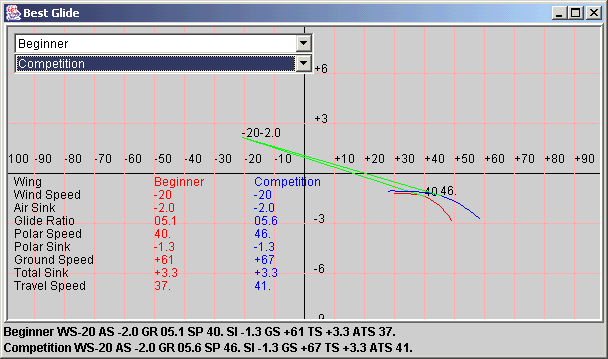 |
|||
| 1 | Beginner 185 km, Competition 205 km | ||
| -1 | Beginner 200 km, Competition 230 km | ||
| -1 | Beginner 305 km, Competition 335 km | ||
| -1 | Beginner 205 km, Competition 185 km | ||
| T3D2 and Reichman Speed to Fly | |||
| N077 | 1 | N | S |
| In this polar diagram comparing a Beginner and a Competition wing. It shows the wings in 2m/s sink and 20 km/h wind pushing you. What should your GPS speed show, to fly optimal? | |||
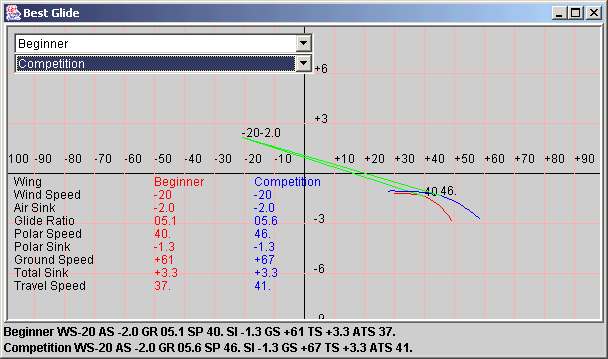 |
|||
| 1 | Beginner 61 km/h, Competition 67 km/h | ||
| -1 | Beginner 40 km/h, Competition 46 km/h | ||
| -1 | Beginner 37 km/h, Competition 41 km/h | ||
| -1 | Beginner 57 km/h, Competition 61 km/h | ||
| T3D2 and Reichman Speed to Fly | |||
| N078 | 1 | N | S |
| In this polar diagram comparing a Beginner and a Competition wing. It shows the wings in 2m/s sink and 20 km/h wind pushing you. How fast, based on your air speed indicator, should the pilots travel to fly optimal? | |||
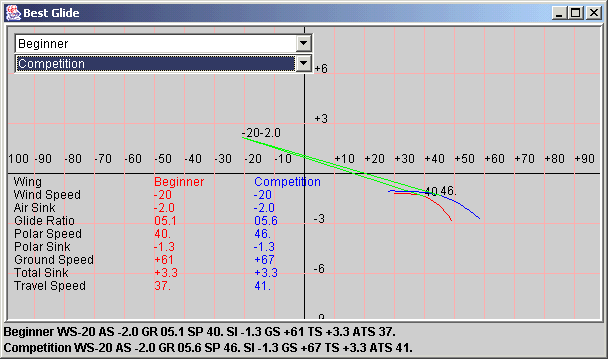 |
|||
| -1 | Beginner 61 km/h, Competition 67 km/h | ||
| 1 | Beginner 40 km/h, Competition 46 km/h | ||
| -1 | Beginner 37 km/h, Competition 41 km/h | ||
| -1 | Beginner 57 km/h, Competition 61 km/h | ||
| T3D2 and Reichman Speed to Fly | |||
| N079 | 1 | N | S |
| With good thermals ahead and the wind pushing you, according to the Speed to Fly theory, how should one fly | |||
| -1 | slower than best glide | ||
| 1 | faster than best glide | ||
| -1 | best glide | ||
| -1 | minimum sink | ||
| www.sahpa.co.za/sahpa/programs, Skygod, T3D2 and Reichman Speed to Fly | |||
| N080 | 1 | N | B |
| What is Class G Airspace ? | |||
| -1 | airspace in which IFR flights and VFR flights are permitted and - (i) all such flights are subject to air traffic control services; (ii) IFR flights are separated from each other and from VFR flights; and (iii) VFR flights are separated from IFR flights and receive traffic information in respect of all other VFR flights; | ||
| 1 | airspace in which IFR flights and VFR flights are permitted and all such flights receive flight information services, if requested. | ||
| -1 | airspace in which IFR flights and VFR flights are permitted and - (i) all such flights are subject to air traffic control services; (ii) IFR flights are separated from each other and receive traffic information in respect of VFR flights; and (iii) VFR flights receive traffic information in respect of all other IFR flights and VFR flights; | ||
| -1 | airspace in which only IFR flights are permitted and all such flights are - (i) subject to air traffic control services; and (ii) separated from each other; | ||
| www.caa.co.za SA-CATS-ATS | |||
| N081 | 1 | N | B |
| Your GPS has gone flat. You are heading along a road at 16.00 with the sun behind you | |||
| 1 | You flying in an Easterly Direction | ||
| -1 | You are flying in a Westerly direction | ||
| -1 | You are flying in a Northerly direction | ||
| -1 | You are floying in a Southerly direction | ||
| N082 | 1 | N | B |
| This shows a part of AIC 45-1. If your takeoff is 1600 m ASL, how high are you allowed to thermal? | |||
 |
|||
| 1 | 545 meters above ground | ||
| -1 | 700 meters above ground | ||
| -1 | 2300 meters above ground | ||
| -1 | 1700 meters above ground | ||
| www.caa.co.za | |||
| N083 | 1 | N | S |
| Flying XC from Welkom in a NE wind. How high can you be over Petrusburg, assuming that Petrusburg got the same height as Welkom of about 1400 m ASL. | |||
 |
|||
| 1 | about 3000 meters above takeoff | ||
| 1 | about 4400 meters above sea level | ||
| 1 | 14500 feet above sea level | ||
| -1 | Not allowed to ebter the airspace over Petrusburg | ||
| Freestate Airspace Map | |||
| N084 | 1 | N | S |
| Flying XC over flatlands, 80 km from takeoff, 2400 m AGL, 17.00, not expecting any thermal activity anymore. Groundspeed is 60 km/h. Average sink is 2m/s. How far will you get and when will you land? | |||
| 1 | 100 km | ||
| 1 | land at 17.20 | ||
| -1 | 110 km | ||
| -1 | land 17.30 | ||
| -1 | not enough info to answer this question | ||
| -1 | 120 km | ||
| -1 | land 17.40 | ||
| -1 | land 17.10 | ||
| -1 | 90 km | ||
| 1 Feb 2004 100 km flight from Welkom along the N1 | |||
| N085 | 1 | N | B |
| A pilot SMS his landing coords as S 26 28.506 E 028 38.025. The recovery types in S 26 28.506 E 028 30.025. Where is the recovery going to look for the pilot? | |||
| 1 | about 14 km West of the pilot | ||
| -1 | about 8km West of the pilot | ||
| -1 | about 14 km East of the pilot | ||
| -1 | about 8 km East of the pilot | ||
| Crazy Chris gets lost while trying to recover Ulf during Dunnottar fun day | |||
| N086 | 1 | N | A |
| Santa zeroes his altimeter inside his grotto... ? | |||
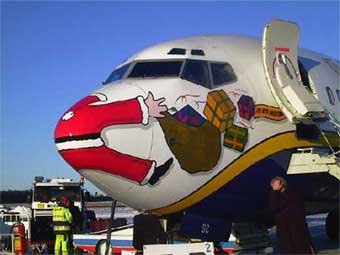 |
|||
| 1 | he will be flying QFE | ||
| -1 | he will be using QNH | ||
| -1 | he is on 1013mb | ||
| -1 | he is flying based on Standard Atmosphere | ||
| http://www.skysystems.co.uk/birdbrain/answer26.htm | |||
| N087 | 1 | N | A |
| As Santa flies level with Mont Blanc, he sets his altimeter to display 4807m, Europe's highest peak... ? | |||
 |
|||
| -1 | he will be flying QFE | ||
| 1 | he will be using QNH | ||
| -1 | he is on 1013mb | ||
| -1 | he is flying based on Standard Atmosphere | ||
| http://www.skysystems.co.uk/birdbrain/answer26.htm | |||
| N088 | 1 | N | A |
| Santa performs a touch and go on the top of Ben Nevis, zeroing his altimeter in the process... ? | |||
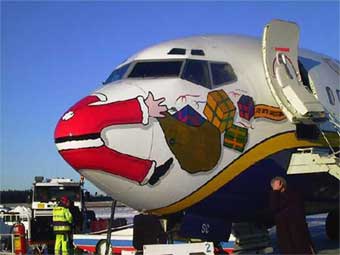 |
|||
| 1 | he will be flying QFE | ||
| -1 | he will be using QNH | ||
| -1 | he is on 1013mb | ||
| -1 | he is flying based on Standard Atmosphere | ||
| http://www.skysystems.co.uk/birdbrain/answer26.htm | |||
| N089 | 1 | N | A |
| Santa uses his airmap to navigate around the high Norwegian mountains and to avoid crashing into them... ? | |||
 |
|||
| -1 | he will be flying QFE | ||
| 1 | he will be using QNH | ||
| -1 | he is on 1013mb | ||
| -1 | he is flying based on Standard Atmosphere | ||
| http://www.skysystems.co.uk/birdbrain/answer26.htm | |||
| N090 | 1 | N | A |
| There are few airliners flying on Christmas Eve, but Santa listens to all Air Traffic Controls to avoid them, not wanting to be spotted... ? | |||
 |
|||
| -1 | he will be flying QFE | ||
| -1 | he will be using QNH | ||
| -1 | he is on QFA | ||
| 1 | he is flying based on Standard Atmosphere | ||
| http://www.skysystems.co.uk/birdbrain/answer26.htm | |||
| N091 | 1 | N | A |
| Xmas Bonus Question: Santa takes off at sea level with his altimeter zeroed and at half the speed of light flies to another sea-level site, hundreds of miles away. His altimeter is now displaying 400m. Did Santa fly into lower or higher pressure? | |||
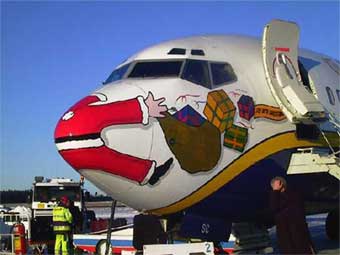 |
|||
| 1 | Santa flew into lower pressure | ||
| -1 | Santa flew into higher pressure | ||
| -1 | Pressure is not linked with altitude | ||
| -1 | His altimeter is faulty | ||
| http://www.skysystems.co.uk/birdbrain/answer26.htm | |||
| N092 | 10 | N | A |
| 100 years ago, the Wright brothers were towing their contraptions airborne before they succeeded in using petrol engines. They used an ingenious 2-pulley system as illustrated. The tow rope is attached to the car, then routed through pulley B which is anchored to the ground, then back to pulley A on the car, then all the way to the Flyer. Q 1. With Orville on board, the minimum take off speed of the Flyer is 40mph. In a 10mph headwind, at what minimum speed should Wilbur drive to launch his brother? | |||
 |
|||
| 1 | 10mph | ||
| -1 | 5mph | ||
| -1 | 15mph | ||
| -1 | 20mph | ||
| http://www.skysystems.co.uk/birdbrain/answer14.htm | |||
| N093 | 10 | N | A |
| 100 years ago, the Wright brothers were towing their contraptions airborne before they succeeded in using petrol engines. They used an ingenious 2-pulley system as illustrated. The tow rope is attached to the car, then routed through pulley B which is anchored to the ground, then back to pulley A on the car, then all the way to the Flyer. After an aborted launch, Orville drags his Flyer back to the launch point, also pulling both rope and car in the process. Wilbur observes 100 yards of rope coming through pulley A. How many yards has Orville moved the Flyer back ? | |||
 |
|||
| 1 | 150 yards | ||
| -1 | 100 yards | ||
| -1 | 200 yards | ||
| -1 | 50 yards | ||
| http://www.skysystems.co.uk/birdbrain/answer14.htm | |||
| N094 | 1 | N | S |
| Flying trim speed at 36 km/h. And the wind from the back pushing with 18 km/h. Average sink rate is 1.5m/s. What is your glide ratio? | |||
| 1 | 10 | ||
| -1 | 5 | ||
| -1 | 7 | ||
| -1 | 15 | ||
| T3D2 Catch that Thermal | |||
| N095 | 1 | N | S |
| Maximum altitude that one can go in SA outside any other restricted areas? | |||
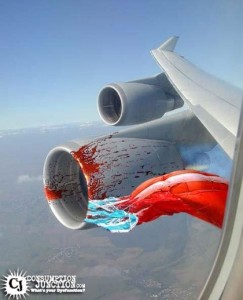 |
|||
| 1 | FL195 - about 5900 m ASL | ||
| -1 | FL110 - around 3300 m ASL | ||
| -1 | unlimited - the picture shows that a minced pilot does not make any impact on a jet engine | ||
| -1 | FL 145 - about 4500 m ASL | ||
| N096 | 1 | N | S |
| Looking from takeoff down towards turkey. The sun is in front of you. It is 11.40. Which way are you facing? | |||
| 1 | North | ||
| -1 | South | ||
| -1 | East | ||
| -1 | West | ||
| -1 | One requires a compass to determine this | ||
| -1 | One requires a GPS to determine this | ||
| Rob+chris argue with Ulf at Langberg | |||
| N097 | 1 | N | S |
| How high, thumbsuck, can one go AGL here ? | |||
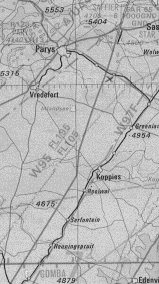 |
|||
| 1 | Under an Airway , about 1800 meters AGL | ||
| -1 | Outside of the JHB TMA, up to 5900 m ASL | ||
| -1 | Still within JHB TMA, 3300 m ASL | ||
| -1 | Inside the SRA, 700 m max AGL | ||
| Parys area | |||
| N098 | 1 | N | S |
| Where is the pilot in relation to 001 ? | |||
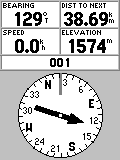 |
|||
| 1 | NW | ||
| -1 | SE | ||
| -1 | E | ||
| -1 | W | ||
| Skykod series | |||